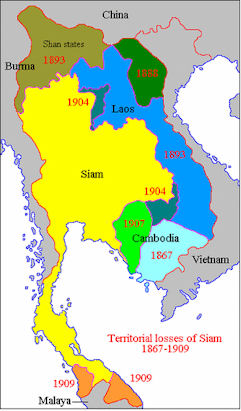

Zitierweise / cite as:
Payer, Alois <1944 - >: Chronik Thailands = กาลานุกรมสยามประเทศไทย. -- Chronik 1826 (Rama III). -- Fassung vom 2015-10-14. -- URL: http://www.payer.de/thailandchronik/chronik1826.htm
Erstmals publiziert: 2013-07-01
Überarbeitungen: 2015-10-14 [Ergänzungen] ; 2015-05-09 [Teilung des Kapitels] ; 2015-05-08 [Ergänzungen] ; 2015-04-22 [Ergänzungen] ; 2015-03-16 [Ergänzungen] ; 2015-03-04 [Ergänzungen] ; 2015-01-24 [Ergänzungen] ; 2014-12-15 [Ergänzungen] ; 2014-11-13 [Ergänzungen] ; 2014-11-04 [Ergänzungen] ; 2014-10-27 [Ergänzungen] ; 2014-09-21 [Ergänzungen] ; 2014-08-20 [Ergänzungen] ; 2014-03-26 [Ergänzungen] ; 2014-03-08 [Ergänzungen] ; 2014-02-26 [Ergänzungen] ; 2014-01-13 [Ergänzungen] ; 2013-12-20 [Ergänzungen] ; 2013-12-05 [Ergänzungen] ; 2013-11-25 [Ergänzungen] ; 2013-11-05 [Ergänzungen] ; 2013-10-11 [Ergänzungen] ; 2013-09-28 [Ergänzungen] ; 2013-09-23 [Ergänzungen] ; 2013-09-17 [Ergänzungen] ; 2013-09-02 [Ergänzungen] ; 2013-08-23 [Ergänzungen] ; 2013-08-21 [Ergänzungen] ; 2013-08-14 [Ergänzungen] ; 2013-08-11 [Ergänzungen] ; 2013-07-13 [Ergänzungen] ; 2013-07-10 [Ergänzungen] ; 2013-07-08 [Ergänzungen]
©opyright: Dieser Text steht der
Allgemeinheit zur Verfügung. Eine Verwertung in Publikationen, die über übliche
Zitate hinausgeht, bedarf der ausdrücklichen Genehmigung des Herausgebers.
Dieser Text ist Teil der Abteilung
Thailand von
Tüpfli's Global Village Library
ช้างตายทั้งตัวเอาใบบัวปิดไม่มิด
|
Gewidmet meiner lieben Frau Margarete Payer die seit unserem ersten Besuch in Thailand 1974 mit mir die Liebe zu den und die Sorge um die Bewohner Thailands teilt. |
|
Bei thailändischen Statistiken muss man mit allen Fehlerquellen rechnen, die in folgendem Werk beschrieben sind:
Die Statistikdiagramme geben also meistens eher qualitative als korrekte quantitative Beziehungen wieder.
|
1826–1841

Huy (เจ้าฮุย) Herrscher von Champasak (ຈຳປາສັກ)
"Prinz Huy (auch H'ui, Brhat Chao; * 1780 in Champasak; † 1840 in Himlot, Champasak) war zwischen 1827 und 1840 Prinzgouverneur (Chao Mueang Nakhon Champasakti) des unter siamesischer Kontrolle stehenden Reiches von Champasak. Prinz (Brhat Chao) Huy war ein Sohn des Maha Uparat von Champasak, Unga (O), der zwischen 1778 und 1781 als Vasall Siams wirkte, doch schließlich von den Siamesen unter König Taksin ermordet wurde. Huy wurde im Pagenkorps am Palast von König Rama I. in Bangkok ausgebildet und trat in die siamesische Armee ein, wo er zum General aufstieg. Im Jahr 1827 sollte er den abtrünnigen Prinzgouverneur Yoh fangen und nach Bangkok bringen, doch stürzte sich dieser vorher von einem Tempeldach. Huy wurde dessen Nachfolger.
Huy starb 1840 und hinterließ sieben Söhne und sieben Töchter."
[Quelle: http://de.wikipedia.org/wiki/Huy_%28Champasak%29. -- Zugriff am 2011-10-15]
1826 - 1846

Phuttawong - เจ้าหลวงพุทธวงศ์ ist König von Chiang Mai
Abb.: Phuttawong - เจ้าหลวงพุทธวงศ์
[Bildquelle: th.Wikipedia. -- Public domain]Unter seiner Herrschaft werden um Chiang Mai viele Dörfer gegründet.
1826/27 - 1837
Chao Luang Chaywong (เจ้าหลวงไชยวงศ์) ist Fürst von Lampang (นครลำปาง)
Abb.: Lage von Lampang (ลำปาง)
[Bildquelle: CIA. -- Public domain]
1826

In Vientiane treffen sich unter Leitung von Anuvong (ສົມເດັຈພຣະເຈົ້າອານຸວົງສ໌ - เจ้าอนุวงศ์, 1767 - 1829), König von Vientiane (ວຽງຈັນ) zur Planung eines Kriegs gegen Siam u.a.:
Vizekönig Upparat Tissa
Chao Sutthisan
Chao Ratsabut Yo
Chao Ratsavong [ເຈົ້າຣາຊວົງສ໌]
Phagna Müang Sai [= Muang Xay - ເມືອງໄຊ = Oudomxay - ອຸດົມໄຊ)
Phra Plat Müang Saen
Phra Plat Müang Chan
Sanon
Chao Kom Satsadi
Koan
Vieng
Koan Sao
Koan Thosana
Koan Khang
1826 - 1829

Krieg zwischen Siam und Vientiane (ວຽງຈັນ).
Abb.: Lage von Vientiane (ວຽງຈັນ)
[Bildquelle: OpenStreetMap. -- Creative Commons Lizenz (Namensnennung, share alike)]
Abb.: แผนที่ยุทธศาสตร์ครั้งรัชสมัยสมเด็จพระรามาธิบดีที่ ๑ = Siamesische Militärkarte für den Siamesisch-Laotischen Krieg, ca. 1827
[Bildquelle: http://kanchanapisek.or.th. -- Zugriff am 2013-06-04]
"Der Siamesisch-Laotische Krieg 1826-1829 war ein bewaffneter Konflikt zwischen dem Königreich Siam und dem laotischen Königreich Vientiane (Vien Chan). In der Folge hörte das Königreich Vientiane auf zu existieren und wurde Teil von Siam und Nong Khai (หนองคาย) eingegliedert. Vorgeschichte
Zu Beginn des 19. Jahrhunderts löste sich das laotische Großreich Lan Chang (ລ້ານຊ້າງ) in drei kleinere Gebiete auf, Luang Phrabang (ຫລວງພະບາງ), Vientiane (ວຽງຈັນ) und Champasak (ຈຳປາສັກ). In den drei Hauptstädten hatten bereits seit 1778 siamesische Gouverneure die Macht Siams durchgesetzt, dessen König Taksin (ตากสินมหาราช) das Königreich Ayutthaya (อาณาจักรอยุธยา) von den überlegenen Birmanen befreit hatte. Die lokalen Könige konnten zwar weiter regieren, hatten aber Tribut an Siam zu entrichten, wie dies auch unter den Nachfolgern Taksins, die der Chakri-Dynastie angehörten, erfolgte. Die siamesischen Könige behielten sich auch das Recht der Bestätigung der neuen Könige vor. 1826 versuchte der letzte König von Vientiane, Anuvong (ເຈົ້າອານຸວົງ, 1767-1829), das siamesische Joch abzuschütteln. Hierzu stärkte er die Beziehungen zum seit dem 17. Jahrhundert aufstrebenden Vietnam und ging ein Bündnis mit Kaiser Minh Mang (明命, 1792-1841) ein. Auch konnte er sich den Posten des Gouverneurs für seinen Sohn in Champasak sichern, womit er den größten Teil des heutigen Staatsgebiets von Laos in der Hand hielt.[1] Er war damit in der Lage, Siam militärisch entgegenzutreten. Die Gelegenheit dazu kam für ihn, als er die - allerdings falsche - Nachricht erhielt, dass eine englische Flotte Bangkok angreifen würde, nachdem die Briten kurz vorher Birma besiegt und in ihr Kolonialreich integriert hatten.
VerlaufDie laotischen Armeen unter Anuvong drangen aus Vientiane, Roi Et (ร้อยเอ็ด) und Ubon Ratchathani (อุบลราชธานี) nach Siam ein, im Anschein einer Verteidigung laotischen Territoriums. Siamesische Truppen zogen sich zusammen, um die Laoten zurückzuwerfen, die anschließend auf Nakhon Ratchasima (นครราชสีมา) und Ubon Ratchathani zurückgeworfen wurden. 1827 begann Siam einen größeren Gegenangriff, der in die Schlacht bei Nong Bua Lamphu (หนองบัวลำภู) mündete, die die laotische Armee nordwärts über den Mekong vertrieb. Bei deren Verfolgung verwüsteten die Siamesen Vientiane und vertrieben Anuvong in die Wälder, sein Volk einem harten Schicksal überlassend.
Anuvong wandte sich an Vietnam um Hilfe und erhielt Truppen, um den Siamesen erneut entgegentreten zu können. Doch desertierten die Vietnamesen auf dem Weg nach Vientiane, dessen unterlegene Streitkräfte den Siamesen nicht standhielten. Erneut musste der König fliehen, diesmal nach Trấn Ninh nördlich von Laos. Die Siamesen drohten, in Trấn Ninh einzumarschieren, woraufhin dessen Herrscher Anuvong auslieferte, um den Frieden zu erhalten.
König Anuvong wurde nach Bangkok geschafft und dort mit seiner Familie in einer längeren Prozedur hingerichtet.
EinzelnachweiseLiteratur
- ↑ Phillips und Axelrod (2004), S. 1042
- Charles Phillips und Alan Axelrod: Encyclopedia of Wars. 3 Bde. New York: Facts on File 2004. ISBN 9780816028511.
- Grant Evans: A Short History of Laos : the land in between. Crows Nest (Australia): Allen Unwin 2002. ISBN 1864489979.
- David K. Wyatt: Thailand : a short history. New Haven: Yale University Press 1984."
[Quelle: http://de.wikipedia.org/wiki/Siamesischer-Laotischer_Krieg_1826%E2%80%931829. -- Zugriff am 2011-11-12]
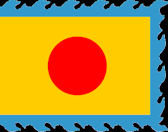
Als Gegenleistung für die Unterstützung Vietnams tritt Anuvong (ເຈົ້າອານຸວົງ, 1767-1829) die Provinzen Huaphan (ຫົວພັນ) und Xiengkhouang (ຊຽງຂວາງ) an Vietnam (越南) ab.
Abb.: Lage der Provinzen Huaphan (ຫົວພັນ) und Xiengkhouang (ຊຽງຂວາງ)
[Bildquelle: CIA. -- Public domain]
1826

Heldentat von Thao Suranari (ท้าวสุรนารี, 1772 - 1852) in Korat (โคราช).
Abb.: Statue von Thao Suranari (ท้าวสุรนารี, 1772 - 1852) / von Silpa Bhirasri (ศิลป์ พีระศรี = Corrado Feroci), Korat (โคราช)
[Bildquelle: Thanyakij / Wikipedia. -- Public domain]
Abb.: Lage von Korat (โคราช)
[Bildquelle: OpenStreetMap. -- Creative Commons Lizenz (Namensnennung, share alike)]
"Thao Suranari (in Thai: ท้าวสุรนารี; * 1772; † 1852) war die Ehefrau des Gouverneurs von Nakhon Ratchasima (นครราชสีมา). Mit 25 Jahren heiratete sie den Gouverneur von Korat (in anderen Quellen auch Festungskommandant genannt). Ihr Name ist Khun Ying Moo (คุณหญิงโม), wobei Moo (โม) Melone bedeutet (Dtaeng Moo) und der vorangestellte Titel Khun Ying noch heute den Namen von Ehefrauen hoher Persönlichkeiten (z. B. Gouverneure, Premierminister, etc.) vorangestellt wird. Den Titel Thao Suranari wurde ihr später von König Nang Klao (Rama III.) verliehen. Als der laotische König Anouvong (ເຈົ້າອານຸວົງ) 1826 mit seinen Truppen die Stadt eroberte, veranstaltete sie mit anderen Frauen ein Trinkgelage außerhalb der Stadt und griff anschließend die betrunkenen Soldaten an. Nach einem Monat konnten so die Laoten vertrieben werden.
Seit dem 5. Januar 1934 steht eine Statue vor dem alten Stadttor (Pratu Chumphon - ประตูชุมพล) von Nakhon Ratchasima. Das Denkmal ist 1,85 m hoch (ohne Sockel) und wurde von dem Künstler Silpa Bhirasri (ศิลป์ พีระศรี = Corrado Feroci, 1882 - 1962) erstellt.
Sie wird von der Bevölkerung als „Großmutter Mo“ oder „Ya Mo“ (ย่าโม) sehr verehrt, ihr zu Ehren wird jedes Jahr Ende März/Anfang April ein 10-tägiges Fest, die „Thao Suranari Fair“ gefeiert."
[Quelle: http://de.wikipedia.org/wiki/Thao_Suranari. -- Zugriff am 2011-11-15]
1826
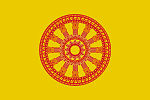
Da das Töten von Tieren dem Buddhismus widerspricht, hebt Rama III. die Steuer auf Fischfallen auf.
1826

Bildung von The Straits Settlements (Negeri-negeri Selat / 海峡殖民地) als Gebiet der British East India Company. Die Straits settlements bestehen aus Malacca, Dinding, Penang und Singapur.
Abb.: Lage von The Straits Settlements
[Bildquelle: Bartholomew, J. G. <1860 - 1920>: A literary & historical atlas of Asia. -- London, o. J.]
1826

Es erscheint:
Birma, Siam, and Anam / [von Josiah conder <1789 - 1855>. -- London : Duncan, 1826. -- 367 S. -- (The modern traveller : a popular description, geographical, historical, and topographica, of the various countries of the globe).
1826

England: James Sharp lässt einen Gasherd patentieren. Gasherde können sich aber erst ab 1880 durchsetzen.
Abb.: Gaskocher, Thailand 2010
[Bildquelle: Emmet Connolly. -- http://www.flickr.com/photos/61462186@N00/5405425817. -- Zugriff am 2013-08-23. -- Creative Commons Lizenz (Namensnennung, keine kommerzielle Nutzung)]
1826-02
Bei Samut Prakan (สมุทรปราการ) wird der Chao Phraya (แม่น้ำเจ้าพระยา) mit einer Kette abgesperrt, sodaß nur ein kleiner Durchlass bleibt. Jeder Schmied in Bangkok musste eine bestimmte Anzahl von Kettengliedern herstellen.
Abb.: Lage von Samut Prakan (สมุทรปราการ)
[Bildquelle: OpenStreetMap. -- Creative Commons Lizenz (Namensnennung, share alike)]
1826-02-25
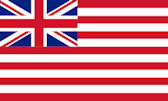

Ende des First Anglo-Burmese War (ပထမ အင်္ဂလိပ် မြန်မာ စစ်). Die britische East India Company erhält im Vertrag von Yandabo (ရန္တပို စာချုပ်) Assam, Manipur, Cachar, Jaintia, Arakan (ရခိုင်ပြည်နယ်) und Tenasserim (ဏၚ်ကသဳ - တနၚ်သြဳ)
Abb.: Lage von Arakan und Tenasserim
[Bildquelle: Hintha / Wikimedia. -- GNU FDLicense]
1826-03-16

Artikel in Singapore Chronicle: "Harbor of Ko-si-chang [เกาะสีชัง]]":
Abb.: Lage von Ko Sichang (เกาะสีชัง)
[Bildquelle: OpenStreetMap. -- Creative Commons Lizenz (Namensnennung, share alike)]
"As a station for an enemy meditating hostile measures against Siam, no place can be better adapted than this harbour. A very small fleet in possession of these islands would effectually blockade the port of Bangkok, at which nearly the whole trade of the Siamese empire is concentrated; and thus dictate terms to the monarch of Siam, without further exertion than the seizure and detention of the numerous junks which trade to Bangkok from various quarters." [Zitiert in: Terwiel, Barend Jan <1941 - >: Through travellers' eyes : an approach to early nineteenth century Thai history. -- Bangkok : Duang Kamol, 1989. -- S. 21.]
1826-06
im Chao Phraya (แม่น้ำเจ้าพระยา) bei Samut Prakan (สมุทรปราการ) werden Palmyrapalmen (Borassus flabellifer) so gepflanzt, dass nur zwei bis drei Schiffe bei der Festung durchfahren können.
Abb.: Palmyrapalmen (Borassus flabellifer), Kambodscha, 2000
[Bildquelle: nocolas pascarel / Wikimedia. -- Creative Commons Lizenz (Namensnennung)]
1826-06-20

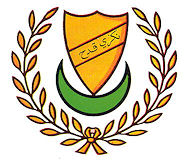
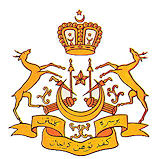
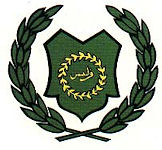
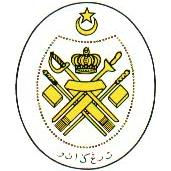
Vertrag zwischen der britischen East India Company und Siam (Burney-Vertrag - สนธิสัญญาเบอร์นี).
Abb.: Lage von Kedah (قدح), Kelantan (كلنتن), Perlis (ﭬﺮليس) und Terengganu (ترڠڬانو)
[Bildquelle: Bukhrin / Wikipedia. -- GNU FDLicense]
"Der Burney-Vertrag (Burney Treaty, Thai: สนธิสัญญาเบอร์นี) war ein Handelsvertrag zwischen Siam und Großbritannien aus dem Jahr 1826. Der Vertrag ist benannt nach dem britischen Gesandten der Britischen Ostindienkompanie Henry Burney (1792-1845). Im Vertrag wurde die siamesische Hoheit über die nördlichen Staaten der Malaien Kedah (قدح), Kelantan (كلنتن), Perlis (ﭬﺮليس) und Terengganu (ترڠڬانو) bestätigt. Gleichzeitig wurde die britische Herrschaft über Penang und dessen Recht auf ungestörten Handel mit Kelantan und Terengganu garantiert. Obwohl der Vertrag sich auf die malaiischen Staaten bezieht, waren diese an den Verhandlungen nicht beteiligt."
[Quelle: http://de.wikipedia.org/wiki/Burney-Vertrag. -- Zugriff am 2011-10-19]
"A new king, Somdetch Pra Nang Klow, ascended the throne in 1824. He had a quiet, peaceful, and prosperous reign of twenty-seven years. As a sovereign he was respected and feared, and governed his kingdom successfully and well according to Siamese lights. But he maintained towards foreigners an attitude of rigid aloofness. " Apparently he did not know them, but in reality he knew all about them. His eye was on them. They were simply suffered to live in the kingdom if they could do so with all the obstacles the then Government placed in their way. In those days no permission could be obtained from the Government for a native to sell land to foreigners or for foreigners to purchase land or to travel. If land was rented to them it was by great men at large sums, but apparently on their own personal responsibility. If foreigners travelled they did so without permission or pass, on their individual responsibility, liable to be called to account by any petty officer who might wish to annoy them." In assuming this attitude the king only reflected the opinions of the bulk of his subjects.
A genuine alarm had been excited by the conquests of the East India Company. As one after another of the Indian States succumbed to the apparently irresistible power of the Company's legions, the fear grew up that the turn of Siam was coming, and the determination was formed to have as little to do with the too intrusive foreigners as was possible. From the Siamese standpoint there was unquestionable merit in this policy. The best way to avert an evil is to keep it at arm's length, and in the light of the history of the past a connection with a European Power was a distinct menace to the independence of a country. So Siam held on its course, living its own life regardless of the blandishments held out to it to enter a wider sphere of trade and politics.
The failure of the Crawfurd mission was not unexpected by those who understood the Siamese character. What was demanded at that period was not a suppliant attitude, but a bold forward policy, calculated to convince the authorities at Bangkok that their aggression in the Malay States, with all that it implied in wasted territory and a decimated population, could not be tolerated with due regard to British interests in that quarter.
Raffles put the matter very clearly in a communication he addressed to the Government of India when he relinquished the administration of Singapore. "The conduct and character of the court of Siam," he wrote, "offer no opening for friendly negotiations on the footing on which European States would treat with each other, and require that in our future communications we should rather dictate what we consider to be just and right than sue for their granting it as an indulgence." Raffles concluded by suggesting that the blockade of the Menam river, which could easily be effected by the cruisers from Singapore, would always bring the Siamese to terms as far as concerned the Malay States.
The Government of India of the time, fearing a Siamese-Burmese combination, was not disposed to strong courses, and, ignoring the advice tendered it, through the medium of Captain Burney it concluded at Bangkok, on June 20, 1826, a treaty with the Siamese Government recognising the conquest of Kedah and compromising other disputed points. The treaty provided for unrestricted trade between the contracting parties "in the English countries of Prince of Wales Island, Malacca, and Singapore, and the Siamese countries of Ligore, Merdilons, Singara, Patani, Junk Ceylon, Quedah, and other Siamese provinces" ; and that the Siamese should not "obstruct or interrupt commerce in the States of Tringanu and Calantan," and that Kedah should remain in Siamese occupation.
In many particulars the treaty of Bangkok was unsatisfactory, if it was not positively detrimental to British interests. While much was conceded in the recognition of the conquest of Kedah, British trade was hampered in various ways. There were, for example, restrictions upon the residence of British traders in Siam, combined with an extremely objectionable clause which enacted that "the English subjects who visit a Siamese country must conduct themselves according to the laws of the Siamese country in every particular."
As the Siamese laws, as we have seen, sanctioned the savage ill-treatment of a British subject for no greater offence than the slaughter of a useless horse, it is obvious that considerable danger to the life and liberty of Englishmen lurked under this proviso. In course of time, as trade between Siam and other countries increased, the features of the treaty to which exception was taken were ignored, because the Siamese, on their part, repeatedly infringed the provisions of the arrangement. The necessity of a regularisation of trade was, however, continually felt, and the British Government kept steadily in view the desirability of concluding a more acceptable compact with the Bangkok authorities."
[Quelle: Arnold Wright in: Twentieth century impressions of Siam : its history, people, commerce, industries, and resources / ed. in chief: Arnold Wright. -- London [etc.] : Lloyds, 1908. -- S. 57f.]
"Henry Burney (* 27. Februar 1792; † 4. März 1845 auf See) war ein britischer Handlungsreisender und Diplomat im Auftrag der Britischen Ostindienkompanie. Er war ein Neffe der englischen Schriftstellerin Fanny Burney (1752–1840). Burney trat 1807 in die Britische Ostindienkompanie ein und nahm am 1. Anglo-Birmanischen Krieg teil. 1818 wurde er zum Leutnant und Adjutanten des 20. Bengalischen Regiments ernannt. Später wirkte er als Agent der Britischen Ostindienkompanie. Er wurde 1825 als Botschafter (emissary) für Siam ernannt und kam 1826 nach Siam, wo er mit König Rama III. einen Handelsvertrag abschloss (heute Burney-Vertrag genannt), der sich positiv auf die weitere Entwicklung der regionalen Kaufmannschaft und auf den Handel zwischen Siam und Europa auswirkte. Zuvor hatte er bereits die Verhandlungen zum Grenzverlauf zwischen Siam und dem von den Briten besetzten Birma geführt, die im beiderseitigen Einvernehmen abgeschlossen wurden. Nur der exakte Verlauf der Grenze am Drei-Pagoden-Pass (Provinz Kanchanaburi) war und blieb lange Zeit umstritten.
Burney wurde 1829 Gesandter am Hof von Ava in Birma und 1834 Oberstleutnant in der Bengalischen Armee.
Burney sammelte Material über Birma und Siam, das er England zugänglich machte. Er war seit 1818 verheiratet mit Janet Bannerman (1799-1865), mit der er 13 Kinder hatte. Sein Onkel, John Alexander Bannerman, war Gouverneur von Penang.
Henry Burney starb am 4. März 1845 auf See. Er liegt auf dem Friedhof Mission Burial Ground, Park Street, in Kalkutta begraben."
[Quelle: http://de.wikipedia.org/wiki/Henry_Burney. -- Zugriff am 2011-10-19]
"The instructions which Burney received from the Penang Council [der East India Company] were by no means identical with those of the Supreme Government [der Bengal Residency der East India Company]. Fullerton [Robert Fullerton, 1733 - 1831, Governor von Penang] had been authorized to modify its orders in the light of his greater knowledge of local conditions, and he took full advantage of the permission. His instructions to Burney were decidedly hostile to Siam, and emphasised as the most important objects of the mission the very points which the Indian Government regarded as only secondary. The Governor held that Burney’s main object was to establish the independence of all the Malay states of the Peninsula lying within the area which is to-day under British control. Siam’s claims to supremacy over them were " a nullity... .the mere assertion of a claim which the asserter never had, never could establish." Unfortunately, owing to the former policy of the Company, the Government had acknowledged the justice of Siam’s pretensions in Kedah [ قدح], and to some extent in Perak [ڤيرق]. So far as these two states were concerned the British case for independence was somewhat weak, and all that could be done was to try to improve their status by negotiations. Fullerton regarded the restoration of the ex-Sultan of Kedah as a matter of the utmost importance, dictated alike by expediency and honour. As for Perak, if Burney were unable to restore it to complete independence, he should try to limit the claims of Siam to the sending of the Bunga Mas [بوڠا مس]. He was also instructed to prevent further Siamese aggression in the other Malay states, and to maintain their independence. Fullerton realised that only the threat of war was likely to make Siam abandon its pretensions to suzerainty over them, and from this Burney was precluded by the orders of the Indian Government. The Governor therefore suggested that perhaps it would be advisable to refrain from all mention of the other states, and to confine the negotiations to the status of Perak and Kedah. The Company had never recognised Siam’s claims over the other states of the Peninsula, and to refrain from all mention of them would leave the Government’s hands free to act in whatever way it chose. Fullerton anticipated that sooner or later the Company would adopt the policy which has been followed .since 1874, of "taking those ..states under our protection and effectually maintaining their independence." Burney’s negotiations at Bangkok lasted from the end of 1825 to June 1826. His despatches fully confirmed the very unfavourable picture Crawfurd [John Crawfurd, 1783-1868] had drawn of the Siamese character, and of the open dishonesty of the government."
[Quelle: Mills, L. A. (Lennox Algernon) <1896 - 1968>: British Malaya, 1824-1867 : with appendix by C. O. Blagden. -- Singapore : Methodist Publ., 1925. -- 338 S. ; 25 cm. -- S. 145]
The powerful Lord who is in possession of every good and every dignity, the God Boodh [Buddha], who dwells over every head in the City of the Sacred and Great Kingdom of Si-a-yoo-ther-sye [Sri Ayutthaya - ศรีอยุธยา] [titles of the King of Siam], incomprehensible to the head and brain; the sacred beauty of the Royal Palace, serene and infallible there [titles of the Wangna [วังหน้า], or Second King of Siam] have bestowed their commands upon the heads of their Excellencies the Ministers of high rank belonging to the Sacred and Great Kingdom of Si-a-yoo-ther-sye, to assemble and frame a Treaty with Captain Henry Burney, the English Envoy on the part of the English Government, the Honourable East India Company who govern the Countries in India belonging to the English, under the authority of the King and Parliament of Engliand; and the Right Honourable Lord Amherst, Governor of Bengal, and other English Officers of high rank, have deputed Captain Burney, as an Envoy, to represent them, and to frame a Treaty with their Excellencies the Ministers of high rank belonging to the Sacres and Great Kingdom of Si-a-yoo-ther-sye, in view that the Siamese and English nations may become great and true friends, connected in love and affection, with genuine candour and sincerity on both sides. The Siamese and English frame two uniform copies of a Treaty, in order that one copy may be placed in the Kingdom of Siam, and that it may become known throughout every great and small Province subject to Siam; and in order that one copy may be placed in Bengal, and that it may become known throughout every great and small Province subject to the English Government, both copies of the Treaty will be attested by the Royal Seal, by the Seals of their Excellencies the Ministers of high rank in the City of the Sacred and Great Kingdom of Si-a-yoo-ther-sye, and by the Seals of the Right Honourable Lord Amherst, Governor of Bengal, and of the other English Officers of high rank. สมเด็จบรมนารถบพิตรพระพุทธเจ้าอยู่หัว ณ กรุงเทพมหานครศรีอยุธยา ล้นเกล้าล้นกระหม่อมพระราชวังบวรสถานมงคล มีรับสั่งโปรดเกล้าฯ ให้ท่านอรรคมหาเสนาบดีผู้ใหญ่ฝ่ายกรุงเทพมหานครศรีอยุธยาพร้อมกันทำหนังสือ สัญญากับกะปิตันหันตรีบารนีทูตอังกฤษฝ่ายกรุงอังกฤษ ณ ระบันอินเดียกุมปันนี ผู้ครองอินเดียของอังกฤษ อยู่ในบังคับกิงอันปาลีแมนอังกฤษ กับเรตอัน ณ ระบันลอดอำหัตสิท เจ้าเมืองมังกะลา แลขุนนางผู้ใหญ่ฝ่ายกรุงอังกฤษ พร้อมกันแต่งให้กะปิตันหันตรีบาระนีเปนทูตแทนตัวมาทำหนังสือสัญญาด้วยท่าน อัคมหาเสนาบดีผู้ใหญ่ ณ กรุงเทพมหานครศรีอยุทธยา ไทยกับชาติอังกฤษได้เปนมหามิตรไมตรีไว้ความสัจผูกรักใคร่ด้วยน้ำใจอันซื่อ ตรงสุจริตต่อกันทั้งสองฝ่าย ไทยอังกฤษทำหนังสือสัญญารวมกันสองฉบับ ให้ไว้ ณ กรุงไทยฉบับหนึ่ง ให้หัวเมืองใหญ่เมืองน้อยซึ่งขั้นแก่กรุงรู้จงทั่ว ให้ไว้ ณ เมืองมังกะลาฉบับหนึ่ง ให้หัวเมืองใหญ่น้อยซึ่งขึ้นแก่กรุงอังกฤษรู้จงทั่ว ปิดตราหลวง ตราท่านอัคมหาเสนาบดีผู้ใหญ่ ณ กรุงเทพมหานครศรีอยุทธยา ลงในหนังสือสัญญาทั้งสองฉบับเปนสำคัญ ปิดตราเรศอันณะระบันลอดอำหัดสิท เจ้าเมืองมังกะลา ตราขุนนางผู้ใหญ่ฝ่ายกรุงอังกฤษ ลงในหนังสือสัญญาทั้งสองฉบับเปนสำคัญ The English and Siamese engage in friendship, love and affection, with mutual truth, sincerity, and candour. The Siamese must not meditate or commit evil, so as to molest the English in any manner. The English must not meditate or commit evil, so as to molest the Siamese in any manner. The Siamese must not go and molest, attack, disturb, seize, or take any place, territory, or boundary belonging to the English in any Country subject to the English. The English must not go and molest, attack, disturb, seize, or take any place, territory, or boundary belonging to the Siamese in any Country subject to the Siamese. The Siamese shall settle every matter within the Siamese boundaries, according to their own will and customs.
ข้อ ๑ ว่า อังกฤษกับไทยเปนไมตรีรักใคร่โดยความสัจสุจริตซื่อตรงต่อกัน ไทยมิได้คิดร้ายที่จะเบียดเบียฬทำสิ่งไรต่ออังกฤษ ๆ มิได้คิดร้ายที่จะเบียดเบียฬทำสิ่งไรต่อไทย แต่บรรดาบ้านเมืองซึ่งขึ้นแก่อังกฤษทั้งสิ้น ไทยไม่ไปเบียดเบียฬรบพุ่งชิงเอาบ้างเมืองเขตรแดนของอังกฤษ แต่บรรดาบ้านเมืองซึ่งขึ้นแก่ไทยทั้งสิ้น อังกฤษไม่ไปเบียดเบียฬรบพุ่งชิงเอาบ้านเมืองเขตรแดนไทย ๆ จะจัดแจงเขตรแดนไทยตามอย่างธรรมเนียมประการใดตามแต่ใจไทย Should any place or Country subject to the English do anything that may offend the Siamese, the Siamese shall not go and injure such place or Country, but first report the matter to the English, who will examine into it with truth and sincerity; and if the fault lie with the English, the English shall punish according to the fault. Should any place or Country subject to the Siamese do anything that may offend the English, the English shall not go and injure such place or Country, but first report the matter to the Siamese, who will examine into it with truth and sincerity; and if the fault lie with the Siamese, the Siamese shall punish according to the fault. Should any Siamese place or Country that is near an English Country, collect at any time an army, or a fleet of boats, if the Chief of the English inquires the object of such force, the Chief of the Siamese Country must declare it. Should any English place or Country that is near a Siamese Country, collect at any time an army, or a fleet of boats, if the Chief of the Siamese Country inquires the object of such force, the Chief of the English Country must declare it.
ข้อ ๒ ถ้าบ้านเมืองใดซึ่งขึ้นแก่อังกฤษจะทำสิ่งใดให้เหลือเกินต่อเมืองไทย ๆ ไม่ไปทำอันตรายแก่บ้านเมือง จะบอกแก่อังกฤษก่อน อังกฤษจะว่ากล่าวให้โดยสัจโดยจริง ถ้าผิด อังกฤษจะทำโทษตามความผิด ถ้าบ้านเมืองใดซึ่งขึ้นแก่ไทยจะทำสิ่งใดให้เหลือเกินต่ออังกฤษ ๆ ไม่ไปทำอันตรายแก่บ้านเมือง จะบอกกล่าวแก่เมืองไทยก่อน ไทยจะว่ากล่าวให้โดยสัจโดยจริง ถ้าผิด ไทยจะทำโทษให้ตามความผิด ถ้าบ้านเมืองไทยซึ่งอยู่ใกล้เมืองอังกฤษจะยกกองทัพเรือไป ถ้าเจ้าเมืองอังกฤษถามว่า จะไปไหน เจ้าเมืองไทยจะต้องบอกแก่เจ้าเมืองอังกฤษ ถ้าบ้านเมืองอังกฤษซึ่งอยู่ใกล้เมืองไทยจะยกกองทัพเรือไป ถ้าเจ้าเมืองไทยถามว่า จะไปไหน เจ้าเมืองอังกฤษจะต้องบอกแก่เจ้าเมืองไทย In places and Countries belonging to the Siamese and English, lying near their mutual borders, whether to the east, west, north, or south, if the English entertain a doubt as to any boundary that has not been ascertained, the Chief on the side of the English must send a Letter with some men and people from his frontier posts, to go and inquire from the nearest Siamese Chief, who shall depute some of his Officers and people from his frontier posts to go with the men belonging to the English Chief, and point out and settle the mutual boundaries, so that they may be ascertained on both sides in a friendly manner. If a Siamese Chief entertain a doubt as to any boundary that has not been ascertained, the Chief on the side of the Siamese must send a Letter with some men and people from his frontier post, to go an inquire from the nearest English Chief, who shall depute some of his Officers and people from his frontier post, to go with men belonging to the Siamese Chief, and point out and settle the mutual boundaries, so that they may be ascertained on both sides in a friendly manner.
ข้อ ๓ ถ้าบ้านเมืองของไทย ของอังกฤษ ฝ่ายทิศตวันขึ้น ฝ่ายทิศตวันตก ทิศลมว่าว ทิศลมสำเภา ที่อยู่ใกล้ต่อแดนกัน ถ้าอังกฤษสงไสยด้วยเขตรแดนยังไม่รู้แน่ ก็ให้เจ้าเมืองฝ่ายข้างอังกฤษมีหนังสือแต่คนแลชาวด่านมาไต่ถามเจ้าเมืองฝ่าย ไทยที่อยู่ใกล้กัน เจ้าเมืองฝ่ายไทยจะแต่งกรมการแลชาวด่านพร้อมด้วยคนเจ้าเมืองฝ่ายอังกฤษไป กำหนดชี้ที่แดนต่อกันให้รู้เปนแน่ทั้งสองข้างโดยทางไมตรี ถ้าเจ้าเมืองฝ่ายไทยสงไสยด้วยเขตรแดนยังไม่รู้แน่ ก็ให้เจ้าเมืองฝ่ายข้างไทยมีหนังสือแต่งคนแลชาวด่านมาไต่ถามเจ้าเมืองฝ่าย อังกฤษที่อยู่ใกล้กัน เจ้าเมืองฝ่ายอังกฤษจะแต่งกรมการแลชาวด่านพร้อมด้วยคนเจ้าเมืองฝ่ายไทยไป กำหนดชี้ที่แดนต่อกันให้รู้แน่ทั้งสองข้างโดยทางไมตรี Should any Siamese subject run and go and live within the boundaries of the English, the Siamese must not intrude, enter, seize, or take such person within the English boundaries, but must report and ask for him in a proper manner; and the English shall be at liberty to deliver the party or not. Should any English subject run and go and live within the boundaries of the Siamese, the English must not intrude, enter, seize, or take such person within the Siamese boundaries, but must report and ask for him in a proper manner; and the Siamese shall be at liberty to deliver the party or not.
ข้อ ๔ ถ้าคนของไทยหนีไปอยู่ในแดนอังกฤษ ไทยไม่ล่วงเกินเข้าไปจับกุมคนในแดนอังกฤษ ไทยจะไปว่ากล่าวขอแต่โดยดี อังกฤษจะยอมให้ก็ได้ ไม่ยอมให้ก็ได้ ถ้าคนอังกฤษหนีไปอยู่ในแดนไทย อังกฤษไม่ล่วงเกินเข้าไปจับกุมคนในแดนไทย อังกฤษจะไปว่ากล่าวขอแต่โดยดี ไทยจะยอมให้ก็ได้ ไม่ยอมให้ก็ได้ The English and Siamese having concluded a Treaty, establishing a sincere friendship between them, merchants, subject to the English, and their ships, junks, and boats, may have intercourse and trade with any Siamese Country which has much merchandize; and the Siamese will aid and protect them, and permit them to buy and sell with facility. Merchants, subject to the Siamese, and their boats, junks, and ships, may have intercourse and trade with any English Country; and the English will aid and protect them, and permit them to buy and sell with facility. The Siamese desiring to go to an English Country, or the English desiring to go to a Siamese Country, must conform to the customs of the place or Country, on either side; should they be ignorant of the customs, the Siamese or English Officers must explain them. Siamese subjects who visit an English Country, must conduct themselves according to the established Laws of the English Country, in every particular. The English subjects who visit a Siamese Country, must conduct themselves according to the established Laws of the Siamese Country, in every particular.
ข้อ ๕ อังกฤษกับไทยได้ทำหนังสือสัญญาเปนไมตรีสุจริตต่อกันแล้ว ถ้าลูกค้าฝ่ายข้างอังกฤษไปมาค้าขาย ณ เมืองไทยที่เมืองมีสินค้ามาก สลุบกำปั่นเรือสำเภาจะไปมาค้าขายได้ ไทยจะทำนุบำรุงให้ซื้อขายโดยสดวก ถ้าลูกค้าฝ่ายข้างไทยไปมาค้าขาย ณ เมืองอังกฤษได้ ๆ เรือสำเภา สลุบกำปั่นจะไปมาค้าขายได้ อังกฤษจะทำนุบำรุงให้ซื้อขายโดยสดวก ไทยจะไปเมืองอังกฤษ ๆ จะไปเมืองไทย ให้ทำตามอย่างธรรมเนียมบ้านเมืองทั้งสองฝ่าย ถ้าไม่รู้อย่างธรรมเนียม ขุนนางไทยให้ขุนนางอังกฤษบอกอย่างธรรมเนียม ให้พวกไทยที่ไปเมืองอังกฤษต้องทำตามกฎหมายอย่างธรรมเนียมเมืองอังกฤษทุกสิ่ง พวกอังกฤษไปเมืองไทยต้องทำตามกฎหมายอย่างธรรมเนียมไทยทุกสิ่ง Merchants subject to the Siamese or English, going to trade either in Bengal, or any other Country subject to the English, or at Bangkok, or in any Country subject to the Siamese, must pay the duties upon commerce according to the customs of the place or Country, on either side; and such merchants and the inhabitants of the Country shall be allowed to buy and sell without the intervention of other persons in such Countries. Should a Siamese or English merchant have any complaint or suit, he must complain to the Officers and Governors, on either side; and they will examine and settle the same, according to the established Laws of the place or Country, on either side. If a Siamese or English merchant buy or sell, without inquiring or ascertaining whether the seller or buy be of a bad or good character and if he meet with a bad man, who takes the property and absconds, the Rulers and Officers must make search and produce the person of the absconder, and investigate the matter with sincerity. If the party possesses money or property, he can be made to pay; but if he does not possess any, or if he cannot be apprehended, it will be the merchant's own fault.
ข้อ ๖ ถ้าลูกค้าฝ่ายเมืองไทยก็ดี เมืองอังกฤษก็ดี จะไปซื้อขาย ณ เมืองมังกะลาแลหัวเมืองขึ้นแก่อังกฤษ จะไปซื้อขาย ณ กรุงไทยแลหัวเมืองขึ้นแก่กรุงไทย ให้ลูกค้าเสียค่าธรรมเนียมในการค้าขายให้ตามอย่างธรรมเนียมบ้านเมืองทั้งสอง ฝ่าย ให้ลูกค้าแลไพร่พลเมืองได้ซื้อขายเองในเมืองนั้น ถ้าลูกค้าไทยถ้าลูกค้าอังกฤษจะมีคะดีข้อความสิ่งใด ๆ ก็ดี ให้ฟ้องร้องต่อขุนนางเจ้าเมืองกรมการฝ่ายไทยฝ่ายอังกฤษ ขุนนางเจ้าเมืองกรมการจะชำระตัดสินให้ตามกฎหมายอย่างธรรมเนียมบ้านเมืองทั้ง สองฝ่าย ถ้าลูกค้าไทยถ้าลูกค้าอังกฤษก็ดีซื้อขายไม่สืบสวนว่าคนชั่วคนดี ซื้อขายปะคนชั่วพาเอาสิ่งของหลบหนีไป แลเจ้าเมืองกรมการจะสืบสวนเอาตัวมาชำระให้โดยสุจริต ถ้ามีเงินมีของใช้ให้ก็ได้ ถ้าไม่มีเงินมีของให้แลมิได้ตัวผู้หนี ก็เพราะลูกค้าทำผิดเอง A merchant subject to the Siamese or English, going to trade in any English or Siamese Country, and applying to build godowns or houses, or to buy or hire shops or houses, in which to place his merchandize, the Siamese or English Officers and Rulers shall be at liberty to deny him permission to stay. If they permit him to stay, he shall land and take up his residence according to such terms as may be mutually agreed on; and the Siamese or English Officers and Rulers will assist and take proper care of him, preventing the inhabitants of the Country from oppressing him, and preventing him from oppressing the inhabitants of the Country. Whenever a Siamese or English merchant or subject, who has nothing to detain him, requests permission to leave the Country, and to embark with his property on board of any vessel, he shall be allowed to do so with facility.
ข้อ ๗ ถ้าลูกค้าฝ่ายไทยฝ่ายอังกฤษก็ดีจะไปซื้อขาย ณ เมืองอังกฤษแลเมืองไทย จะขอตั้งห้างตั้งเรือน จะขออาไศรยเช่าที่โรงเรือนใส่สินค้า ถ้าขุนนางไทยถ้าขุนนางอังกฤษแลเจ้าเมืองกรมการไม่ยอมให้อยู่ ก็อยู่ไม่ได้ ถ้ายอมให้อยู่ จึ่งให้ลูกค้าขึ้นอยู่ตามสัญญาว่ากล่าวกัน แลให้ขุนนางไทยแลให้ขุนนางอังกฤษแลเจ้าเมืองกรมการช่วยดูแลเอาใจใส่ อย่าให้ไพร่บ้านพลเมืองทำข่มเหงแก่ลูกค้า อย่าให้ลูกค้าทำข่มเหงแก่ไพร่บ้านพลเมือง ถ้าลูกค้าอังกฤษพวกอังกฤษลูกค้าไทยพวกไทยที่ไม่เกี่ยวข้องจะขนเอาสิ่งของลง เรือสำเภาสลุบกำปั่นลากลับไปบ้านเมืองเมื่อใด ก็ให้ได้กลับไปโดยสดวก If a merchant desire to go and trade in any place or Country belonging to the English or Siamese, and his ship, boat, or junk, meet with any injury whatever, the English or Siamese Officers shall afford adequate assistance and protection. Should any vessel belonging to the Siamese or English be wrecked in any place or Country where the English or Siamese may collect any of the property belonging to such vessel, the English or Siamese Officers shall make proper inquiry, and cause the property to be restored to its owner, or in case of his death, to his heir, and the owner or heir will give a proper remuneration to the persons who may have collected the property. If any Siamese or English subject die in an English or Siamese Country, whatever property he may leave shall be delivered to his heir; if the heir be not living in the same Country, and unable to come, appoint a person by Letter to receive the property, the whole of it shall be delivered to such person.
ข้อ ๘ ถ้าลูกค้าจะไปค้าขายบ้านใดเมืองใดฝ่ายไทยฝ่ายอังกฤษก็ดี ถ้าสลุบกำปั่นเรือแลสำเภาของอังกฤษของไทยก็ดีจะเปนอันตรายสิ่งใดสิ่งหนึ่ง ขุนนางไทยแลขุนนางอังกฤษจะช่วยทำนุบำรุงกว่าจะเสร็จ ถ้าสลุบกำปั่นเรือสำเภาของอังกฤษของไทยก็ดีแตกลงที่บ้านใดเมืองใด ไทยอังกฤษเก็บได้สิ่งของในสลุบในกำปั่นเรือสำเภาที่แตกมากน้อยเท่าใด ให้ขุนนางอังกฤษให้ขุนนางไทยชำระไล่เลียงเอาสิ่งของคืนให้แก่เจ้าของ ถ้าเจ้าของตายก็ให้คืนให้แก่พวกพ้อง ให้เจ้าของแลพวกพ้องแทนคุณผู้เก็บได้ตามสมควร ถ้าพวกไทยพวกอังกฤษไปเมืองอังกฤษไปเมืองไทยตาย สิ่งของพวกไทยพวกอังกฤษมีอยู่มากน้อยเท่าใด ให้คืนให้พวกพ้องของอังกฤษของไทย ถ้าพวกพ้องไทยถ้าพวกพ้องอังกฤษไม่มีที่เมืองนั้น อยู่เมืองอื่นมามิได้ จะแต่งคนถือหนังสือมารับเอาสิ่งของ ก็ให้ส่งสิ่งของให้แก่ผู้ถือหนังสือให้สิ้น Merchants subject to the English, desiring to come and trade in any Siamese Country, with which it has not been the custom to have trade and intercourse, must first go and inquire of the Governor of the Country. Should any Country have no merchandize, the Governor shall inform the ship that has come to trade that there is none. Should any Country have merchandize sufficient for a ship, the Governor shall allow her to come and trade.
ข้อ ๙ ถ้าลูกค้าข้างอังกฤษจะใคร่มาค้าขาย ณ เมืองของไทยที่ยังไม่เคยไปมาค้าขาย ให้ลูกค้าเข้าหาพระยาผู้ครองเมืองก่อน ถ้าเมืองไหนไม่มีสินค้า พระยาผู้ครองเมืองก็จะบอกว่า สลุบกำปั่นจะมาค้าขาย หามีสินค้าไม่ ถ้าเมืองไหนมีสินค้าพอจะรับสลุบพอจะรับกำปั่นได้ พระยาผู้ครองเมืองก็จะให้สลุบให้กำปั่นมาค้าขาย The English and Siamese mutually agree, that there shall be an unrestricted trade between them in the English Countries of Prince of Wales' Island, Malacca, and Singapore, and the Siamese Countries of Ligore [ลิกอร์, heute: Nakhon Sithammarat - นครศรีธรรมราช], Merdilony [?], Singora [Songkhla - สงขลา], Patam [Pattalung - พัทลุง], Junkceylon [Ujong Salan /Phuket- ภูเก็ต], Queda [قدح], and other Siamese Provinces. Asiatic merchants of the English Countries, not being Burmese, Peguers, or descendants of Europeans, shall be allowed to trade freely overland, and by means of the rivers. Asiatic merchants, not being Burmese, Peguers, or descendants of Europeans, desiring to enter into and trade with the Siamese Dominions, from the Countries of Mergui [မြိတ်မြို့], Tavoy [ထားဝယ်မြို့], Tenasserim [တနင်္သာရီတိုင်းဒေသကြီး], and Ye [เมืองเย], which are now subject to the English, will be allowed to do so freely, overland and by water, upon the English furnishing them with proper certificates; but merchants are forbidden to bring opium, which is positively a contraband article in the Territories of Siam; and should a merchant introduce any, the Governor shall seize, burn, and destroy the whole of it.
ข้อ ๑๐ อังกฤษแลไทยสัญญาต่อกัน การค้าขายซึ่งจะมีต่อกันโดยสดวกในเมืองอังกฤษ เมืองเกาะหมาก เมืองมลากา เมืองสิงหะโปรา แลเมืองของไทย คือ เมืองนคร เมืองพัทลุง เมืองสงขลา เมืองตานี เมืองถลาง เมืองไทร และหัวเมืองอื่น ๆ ลูกค้าจีนลูกค้าแขกเมืองอังกฤษให้ได้ค้าขายทางบกทางคลองโดยสดวก ถ้าลูกค้าจีนลูกค้าแขกเมืองมฤท เมืองทวาย เมืองตนาว เมืองเยซึ่งขึ้นกับอังกฤษจะเข้ามาค้าขาย ณ เมืองไทย อังกฤษจะมีหนังสือเข้ามาเปนสำคัญ ให้ได้ค้าขายทางบกทางน้ำโดยสะดวก แล้วจะห้ามมิให้ลูกค้าเอาฝิ่นซึ่งเปนของต้องห้ามเข้ามาค้าขาย ณ เมืองไทยเปนอันขาด ถ้าลูกค้าขืนเอาฝื่นเข้ามาขายเมืองใด ให้พระยาผู้ครองเมืองเก็บริบเอาฝิ่นเผาไฟเสียให้สิ้น If an Englishman desire to transmit a letter to any person in a Siamese or other Country, such person only, and no other, shall open and look into the letter. If a Siamese desire to transmit a letter to any person in an English or other Country, such person only, and no other, shall open and look into the letter.
ข้อ ๑๑ ถ้าอังกฤษจะมีหนังสือมาถึงผู้ใด ณ เมืองไทยก็ดี ณ เมืองอื่น ๆ ก็ดี ให้ผู้นั้นเปิดหนังสือมิ ให้ผู้อื่นเปิดหนังสือออกดู ถ้าไทยจะมีหนังสือไปถึงผู้ใด ณ เมืองอังกฤษก็ดี ณ เมืองอื่น ๆ ก็ได้ ให้ผู้นั้นเปิดหนังสือ มิให้ผู้อื่นเปิดหนังสือออกดู Siam shall not go and obstruct or interrupt commerce in the States of Tringano [Terngganu - ترڠڬانو] and Calantan [Kelantan - كلنتن]. English merchants and subjects shall have trade and intercourse in future with the same facility and freedom as they have heretofore had, and the English shall not go and molest, attack or disturb those States, upon any pretence whatever.
ข้อ ๑๒ เมืองไทยไม่ไปขัดขวางทางค้าขาย ณ เมืองตรังกะนู เมืองกลันตัน ให้ลูกค้าพวกอังกฤษได้ไปมาค้าขายโดยคล่องสดวกข้างน่าเหมือนแต่ก่อน อังกฤษไม่ไปเบียดเบียฬรบกวนเมืองตรังกะนูเมืองกลันต้นด้วยการสิ่งใด The Siamese engage to the English that the Siamese shall remain in Queda [قدح], and take proper care of that Country and of its people; the inhabitants of Prince of Wales' Island [Penang] and of Queda shall have trade and intercourse as heretofore; the Siamese shall levy no duty upon stock and provisions, such as cattle, buffaloes, poultry, fish, paddy, and rice, which the inhabitants of Prince of Wales' Island, or ships there, may have occasion to purchase in Queda; and the Siamese shall not farm the mouths of rivers or any stream in Queda, but shall levy fair and proper import and export duties. The Siamese further engage, that when Chao Phaya [เจ้าพระยา] of Ligore [ลิกอร์ = Nakhon Si Thammarat - ครศรีธรรมราช] returns from Bangkok, he shall release the slaves, personal servants, family and kindred belonging to the former Governor of Queda, and permit them to go and live whatever they please. The English engage to the Siamese, that the English do not desire to take possession of Queda, that they will not attack nor disturb it, nor permit the former Governor of Queda, or any of his followers, to attack, disturb, or injure in any manner, the Territory of Queda, or any other Territory subject to Siam. The English engage that they will make arrangements for the former Governor of Queda to go and live in some other Country, and not at Prince of Wales' Island [Penang] or Prye [เมืองไทร], or in Perak [ڤيرق], Salengore [Salangor - سلاڠور], or any Burmese Country. If the English do not let the former Governor of Queda go and live in some other Country, as here engaged, the Siamese may continue to levy an export duty upon paddy and rice in Queda. The English will not prevent any Siamese, Chinese, or other Asiatic, at Prince of Wales' Island, from going to reside to in Queda, if they desire it.
ข้อ ๑๓ ไทยสัญญาต่ออังกฤษว่า ไทยให้อยู่รักษาเมืองไทร แลไพร่พลเมือง ๆ ไทร แลคนเมืองเกาะหมากเมืองไทรจะได้ไปมาค้าขายอย่างเดิม แลโคกระบือแลเป็ดไก่แลปลาเข้าเปลือกเข้าสารซึ่งเปนเสบียงอาหารไพร่พลเมือง ๆ เกาะหมาก แลกำปั่นในเมืองเกาะหมากต้องการจะซื้อแต่เมืองไทร ไทยไม่เรียกภาษี แลปากน้ำคลองใด ๆ ที่เมืองไทร ไทยไม่ตั้งส่วยทด ไทยเรียกเอาจังกอบภาษีตามสมควร ไทยสัญญาว่า เจ้าพระยานครกลับออกไปแต่กรุงจะปล่อยครอบครัวทาษบ่าวคนของพระยาไทรคนเก่าให้ กลับคืนไปตามชอบใจ อังกฤษสัญญาต่อไทยว่า ไม่ต้องการเอาเมืองไทร อังกฤษไม่รบกวนเมืองไทร แลไม่ให้พระยาไทรคนเก่ากับบ่าวไพร่ของพระยาไทรคนเก่าไปรบกวนทำอันตรายสิ่ง หนึ่งสิ่งใด ณ เมืองไทรแลเมืองอื่น ๆ ซึ่งขึ้นกับเมืองไทร แลอังกฤษสัญญาว่า จะจัดแจงให้พระยาไทรคนเก่าไปอยู่เมืองอื่น ไม่ให้พระยาไทรคนเก่าอยู่ที่เมืองเกาะหมาก เมืองไทร เมืองเปหระ เมืองสลาหงอ เมืองพม่า ถ้าอังกฤษไม่ให้พระยาไทรคนเก่าไปอยู่เมืองอื่นตามสัญญา ก็ให้ไทยเรียกเอาภาษีเข้าเปลือกเข้าสารที่เมืองไทรเหมือนแต่ก่อน อังกฤษสัญญาว่า ไทย ว่า แขก ว่า จีน ซึ่งอยู่ ณ เมืองเกาะหมาก จะมาอยู่ ณ เมืองไทร อังกฤษไม่ห้าม The Siamese and English mutually engage, that the Rajah of Perak shall govern his Country according to his own will. Should he desire to send the Gold and Silver Flowers to Siam and heretofore, the English will not prevent his doing as he may desire. If Chao Phya of Ligore desire to send down to Perak, with friendly intentions, 40 or 50 men, whether desires to send any of his Ministers or Officers to seek Chao Phya of Ligore, the English shall not forbid them. The Siamese or English shall not send any force to go and molest, attack, or disturb Perak. The English will not allow the State of Salengore to attack or disturb Perak; and the Siamese shall not go and attack or disturb Salengore. The arrangements stipulated in these two last Articles respecting Perak and Queda, Chao Phya of Ligore shall execute as soon as he returns home from Bangkok.
ข้อ ๑๔ ไทยกับอังกฤษสัญญาต่อกันว่า ให้พระยาเปหระคลองเมืองเปหระตามใจพระยาเปหระ ถ้าพระยาเปหระจะถวายดอกไม้ทองดอกไม้เงิน ณ กรุงตามแต่ก่อน ก็ตามใจพระยาเปหระ อังกฤษไม่ห้ามปราม เจ้าพระยานครจะใช้ไทยใช้แขกใช้จีนคนฝ่ายไทยลงไปเมืองเปหระโดยดี ๔๐ คน ๕๐ คน ถ้าพระยาเปหระจะใช้ศรีตวัน กรมการฝ่ายเมืองเปหระ มาหาเจ้าพระยานคร อังกฤษไม่ห้าม ไทยอังกฤษไม่ยกกองทัพไปเบียดเบียฬรบกวน ณ เมืองเปหระ อังกฤษไม่ให้เมืองสลาหงอมารบกวนเมืองเปหระ ไทยก็ไม่ไปรบกวนเมืองสลาหงอ การซึ่งสัญญาเมืองไทรเมืองเปหระ ๒ ข้อนี้ ต่อเมื่อเจ้าพระยานครกลับออกไปแต่กรุง จึ่งจะได้จัดแจงตามสัญญา The 14 Articles of this Treaty, let the great and subordinate Siamese and English Officers, together with every great and small Province, hear, receive, and obey without fail. Their Excellencies the Ministers of high rank at Bangkok, and Captain Henry Burney, whom the Right Honourable Lord Amherst, Governor of Bengal, deputed as an Envoy to represent his Lordship, framed his Treaty together, in the presence of Prince Krom Meun Soorin Thirakser [น่าพระที่นั่งเจ้ากรมหมื่นสุรินทรักษ], in the City of the Sacred and Great Kingdom of Si-a-yoo-ther-sye. The Treaty, written in the Siamese, Malayan, and English languages, was concluded on Tuesday, on the 1st day of the 7th decreasing moon, 1188 year, dog 8, according to the Siamese era, corresponding with the 20th of June, 1826, of the European era. Both copies of the Treaty are sealed and attested by their Excellencies the Ministers and by Captain Henry Burney. One copy Captain Burney will take for the ratification of the Governor of Bengal; and one copy, bearing the Royal Seal, Chao Phya of Ligore, will take and place at Queda. Captain Burney appoints to return to Prince of Wales' Island in seven months, in the 2nd moon of the year 118, dog 8, and to exchange the Ratification of this Treaty with Phra Phakdi Bori-rak [พระปริรัก], at Queda.
The Siamese and English will form a friendship that be perpetuated, that shall know no end or interruptions as long as heaven and earth appear.
A literal translation from the Siamese.
H. Burney, Captain, Envoy to the Court of Siam.แลความสัญญา ๑๔ ข้อนี้ ให้ขุนนางผู้ใหญ่ผู้น้อยฝ่ายไทยฝ่ายอังกฤษทุกหัวเมืองใหญ่หัวเมืองน้อยทั้ง สิ้นด้วยกันฟังเอาถ้อยคำสัญญานี้เถิด แลหนังสือสัญญานี้ ท่านอัคมหาเสนาบดีผู้ใหญ่ ณ กรุงเทพฯ กับกะปิตันหันตรีบาระนี ซึ่งเรตอันบันลอดอำหัดสิท เจ้าเมืองมังกะลา ใช้ให้เปนทูตเข้ามาแทนตัวเจ้าเมืองมังกะลา พร้อมกันทำ ณ กรุงเทพมหานครศรีอยุทธยา น่าพระที่นั่งเจ้ากรมหมื่นสุรินทรักษ เปนอักษไทย อักษรมาลายู อักษรอังกฤษ ทำแล้วเสร็จ ณ วันอังคาร เดือนเจ็ด แรมค่ำหนึ่ง ศักราชไทย ๑๑๘๘ ปีจอ อัฐศก ศักราชฝรั่ง ๑๘๒๖ ปี เดือนยูน ๒๐ วัน ปิดตราท่านอัคมหาเสนาบดี แลปิดตรากะปิตันหันตรีบาระนีลงเปนสำคัญทั้งสองฉบับ แล้วฉบับหนึ่ง กะปิตันหันตรีบาระนีเอาออกไปปิดตราเจ้าเมืองมังกะลา ฉบับหนึ่ง ปิดตราหลวง ณ กรุงเทพมหานครศรีอยุทธยา เจ้าพระยานครเอาออกไปไว้ ณ เมืองไทร กะปิตันหันตรีบาระนีกำหนดใน ๗ เดือน ณ เดือนยี่ ปีจอ อัฐศก จะกลับมาให้ถึงเมืองเกาะหมาก แล้วจะเอาหนังสือสัญญามาเปลี่ยนต่อพระปริรัก ณ เมืองไทร ไทยกับอังกฤษก็จะเปนไมตรีกันสืบต่อไปไม่รู้สิ้นไม่รู้สุดชั่วฟ้าแลดิน
(ตราหลวงพระอัยราพต) (ตราพระราชสีห) (ตราพระคชสีห) (ตราบัวแก้ว) (ตราพระนนทการ) (ตราพระพิรุณ) (ตราพระยมขี่สิงห์) (ตราบาระนี) Quelle: http://en.wikisource.org/wiki/Burney_Treaty. -- Zugriff am 2015-02-19 Quelle: http://th.wikisource.org/wiki/สนธิสัญญาเบอร์นี. -- Zugriff am 2015-02-29 Burney gelingt es, Siam zu zwingen, 585 gefangene Birmanen nach Tenasserim (တနင်္သာရီတိုင်းဒေသကြီး) zu repatriieren.
1826-07-10
Henry Burney (1792-1845) über die Ansprüche Siams auf die malaiischen Staaten:
"Burney refused to admit the validity of their [Siams] claims, contending that the Bunga Mas [بوڠا مس] was merely a "token of respect, friendship and awe," sent by two weak states to a powerful empire, and that Trengganu [ترڠڬانو] and Kelantan [كلنتن] "had not given up their independence The English cannot admit that those Malayan states are subject to Siam in the same manner as her own provinces of Ligore [Ligor, Nakhon Si Thammarat - อาณาจักรนครศรีธรรมราช] and Singora [Songkhla - สงขลา].... (or) to the same extent as Prince of Wales Island [Penang - بينانج] is a possession of the English." [Zitiert in: Mills, L. A. (Lennox Algernon) <1896 - 1968>: British Malaya, 1824-1867 : with appendix by C. O. Blagden. -- Singapore : Methodist Publ., 1925. -- 338 S. ; 25 cm. -- S. 148f.]
1826-08 - 11826-11
Die Steuer-, Fron- und Militärpflichtigen im Nordosten (Laoten) werden tätowiert und so als Untertane Siams gekennzeichnet (u.a.) in:
Khorat (โคราช)
Sakhon Nakhon (สกลนคร)
Nakhon Phanom (นครพนม)
Siang Teng (ຊຽງແຕງ = Stung Treng - ខេត្តស្ទឹងត្រែង)
Saenpang (Siem Pang - សៀមប៉ាង)
Khong (ໂຂງ)
Attapeu (ອັດຕະປື)
Surin (สุรินทร์)
Khukhan (ขุขันธ์, Hauptstadt von Sisaket - ศรีสะเกษ))
Der Gouverneur von Saraburi (สระบุรี) weigert sich, seine Untertanen zusammenzutreiben zur Tätowierung.
Abb.: Lage der genannten Örtlichkeiten
[Bildquelle: CIA. -- Public domain]
1826-09-05

Henry Burney (1792-1845) über seine Verhandlungen mit Siam:
"I could not wish to set my worst enemy a more difficult task than to send him to Bangkok, to negotiate matters connected with the Malay Peninsula without authority or means for employing effectual intimidation." [Zitiert in: Mills, L. A. (Lennox Algernon) <1896 - 1968>: British Malaya, 1824-1867 : with appendix by C. O. Blagden. -- Singapore : Methodist Publ., 1925. -- 338 S. ; 25 cm. -- S. 146]
1826-09-20

Robert Fullerton (1733 - 1831), der Governor von Penang, über die Zugeständnisse, die Siam im Burney-Vertrag gemacht hat:
"They appear to be advantageous, but so little faith do I repose in their fulfilment that I scarcely think it worth while to enter into any serious discussion regarding them." [Zitiert in: Mills, L. A. (Lennox Algernon) <1896 - 1968>: British Malaya, 1824-1867 : with appendix by C. O. Blagden. -- Singapore : Methodist Publ., 1925. -- 338 S. ; 25 cm. -- S. 147]
"After several months of negotiations Article XII of the Burney Treaty was finally evolved: "Siam shall not go and obstruct or interrupt commerce in the states of Tringano [Terengganu - ترڠڬانو] and Calantan [Kelantan - كلنتن]; English merchants and subjects shall have trade and intercourse in future with the same facility and freedom as they have heretofore had; and the English shall not go and molest, attack or disturb those states upon any pretence whatever."
The Article raised a storm of protest at Penang. Fullerton declared that it was
"so worded as to amount to the admission of the actual dependence of Tringano and Calantan on Siam,"
and that the phraseology was so vague that two entirely opposite meanings could be drawn from it. The British might argue that it precluded Siam from any interference,
"for every such interference must produce confusion and interruption of trade: it might be construed as conveying to us the right of direct interposition in case of such interference."
The Siamese however might contend that the article gave them
"the right of complete subjugation, so long as our trade is not interrupted."
If the article could be interpreted as giving the British
" the right of interposition in the event of the Siamese intermeddling in their affairs, assuming a paramount control—in short protecting them in their independence,—all is gained that we require."
Under this condition, and only under this condition Fullerton would recommend that Article XII be ratified."
[Quelle: Mills, L. A. (Lennox Algernon) <1896 - 1968>: British Malaya, 1824-1867 : with appendix by C. O. Blagden. -- Singapore : Methodist Publ., 1925. -- 338 S. ; 25 cm. -- S. 149]
1826-09-20

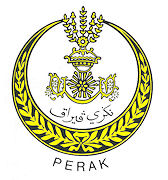
Der britische Governor von Penang sendet Captain James Low (gest. 1852), einen strikten Anti-Siamesen, mit 40 Sepoy (indische Soldaten) auf einem kleinen Kriegsschiff nach Perak (ڤيرق).
Abb.: Lage von Penang und Perak (ڤيرق)
[Bildquelle: OpenStreetMap. -- Creative Commons Lizenz (Namensnennung, share alike)]
"Low was instructed to explain to the Sultan that by the terms of the treaty he need not be tributary to Siam unless he so desired; and to advise him to write a letter declaring his wish to be independent. The Sultan was to be assured that he might " rely on the assistance of the British in expelling any Siamese who may proceed to Perak, and resisting any interference with his government."
Captain Low was also instructed to inquire into the objects and actions of the various Siamese bands which had been appearing and disappearing in Perak, and if any were· still present, to
" warn them to depart forthwith."
Low was empowered merely to make an inquiry into the condition of Perak, and to promise the Sultan that he could rely on the Company’s support in case of Siamese aggression.
Captain Low however was a member of the anti-Siamese party at Penang, and he interpreted his instructions in a broad and catholic spirit. To be more precise, he exceeded them in a thoroughgoing fashion which drew down upon himself the horrified rebuke of the Governor-General of India. "
[Quelel: Mills, L. A. (Lennox Algernon) <1896 - 1968>: British Malaya, 1824-1867 : with appendix by C. O. Blagden. -- Singapore : Methodist Publ., 1925. -- 338 S. ; 25 cm. -- S. 154]
1826-09-30

Stanislas Baudry (1777 - 1830) eröffnet in Nantes die erste Pferde-Omnibus-Linie, die Dames Blanches.
Abb.: Dame Blanche
Abb.: Omnibusse, Bangkok, 2007
[Bildquelle: Ian Fuller. -- http://www.flickr.com/photos/18684820@N00/443358417. -- Zugriff am 2013-10-11. -- Creative Commons Lizenz (Namensnennung, keine kommerzielel Nutzung)]
1826-10-18


Captain Low, der zur Anti-Siamesischen Gruppe in Penang gehört, überschreitet seine Kompetenzen und schließt mit Perak (ڨيرق) einen Vertrag ab, in dem er Perak britischen Schutz verspricht als Gegenleistung dafür, dass Perak die Protektorats-Beziehung zu Siam auflöst. Es gibt keinen Beleg dafür, dass der Governor General der Bengal-Presidency der East India Company den Vertrag je ratifiziert hat.
Abb.: Lage von Penang und Perak (ڨيرق)
[Bildquelle: Bartholomew, J. G. <1860 - 1920>: A literary & historical atlas of Asia. -- London, o. J.]
"The terms of the treaty, which was signed on October 18, 1826, were as follows:—
- The Sultan promised never to have any communication with Siam, Ligor [Nakhon Si Thammarat - อาณาจักรนครศรีธรรมราช], Selangor [سلاڠور] or any other Malay state on political affairs or on the administration of Perak [ڨيرق]. He also agreed not to support any of his subjects who might league themselves with these states so as to cause disturbance in Perak.
- " Henceforth and forever" the Sultan would send neither the Bunga Mas [بوڠا مس] nor any other form of tribute to any of the above states; and he would not permit embassies from them even to enter Perak if their object was political. Furthermore no party from these states should ever be allowed to enter Perak " should its strength even consist of no more than thirty men." If " such parties or armaments " arrived, or if the above-mentioned states allied themselves with the Sultan’s subjects to disturb his rule, he would rely, " as he now relies and in all future times will rely, on the friendly aid and protection of the. .. .Company. .. .to be manifested in such a manner and by such means as may to them seem most expedient."
- " If His Majesty... .will faithfully adhere to and perform all and each of the stipulations contained in this engagement, .. then His Majesty shall receive the assistance of the British in expelling from his country any Siamese or Malays as above states, who.... may at any time enter the Perak Country with political views or for the purpose of interfering in any way with the government of His Majesty." If however the Sultan failed to perform any part of the treaty, " the obligation on the British to protect him assist him against his enemies shall cease."
- Anderson’s [John Anderson, 1795 - 1845] commercial and political treaty of 1825 was confirmed, and it was made clear that the prohibition against entering Perak did not apply to " bona fide " traders. Merchants of every country could trade unmolested in Perak provided they did not interfere in its affairs.
- The treaty was to be perpetual, and the Sultan insisted on inscribing on it that he had signed voluntarily and " with great satisfaction."
[Zitiert in: Mills, L. A. (Lennox Algernon) <1896 - 1968>: British Malaya, 1824-1867 : with appendix by C. O. Blagden. -- Singapore : Methodist Publ., 1925. -- 338 S. ; 25 cm. -- S. 155f.]
1826-11 - 1827


Perak (ڨيرق): Kurau River Incident
"Before the decision of the Government of India [über den Low-Perak-Vertrag] was received the Kurau River Incident occurred. The Kurau was a river in Perak [ڨيرق] some ten leagues south of Penang, which for several years had been the headquarters of a band of about one hundred Malay pirates under Hakhoda (Captain) Udin. He had been denounced as a pirate in 1822 by the Raja of Ligor [Nakhon Si Thammarat - อาณาจักรนครศรีธรรมราช]; but soon afterwards the two formed an alliance. Udin was allowed to pursue his piratical raids unmolested, and was furthermore appointed by the Raja Governor of the Kurau River District. In return Udin aided his patron in his efforts to destroy the independence of Perak. The Sultan of Perak was powerless to expel Udin; and by 1826 the pirate had grown so bold that he made almost nightly raids into Penang harbour and kidnapped many British subjects whom he sold as slaves. The situation became intolerable, and with the cordial assent of the Sultan of Perak Fullerton [Robert Fullerton, 1733 - 1831, Governor von Penang] sent Low and a force of sepoys [indische Soldaten] to destroy Udin’s stronghold. The position was captured, Udin and many of his men being taken prisoners. Since the court at Penang did not possess Admiralty jurisdiction, it was not competent to try him, and he was accordingly sent to the Raja of Ligor with a polite request that he should be put on trial there. The Raja quite failed to see the humour of the situation. Indeed, he was very seriously annoyed, and when in June 1827 Burney [Henry Burney, 1792-1845] came to Ligor to exchange the ratified copies of the treaty of 1826 with Siam, he complained bitterly of the attack on Udin as a violation of Siamese territorial rights. He contended that the Kurau was part of Kedah [قدح], and not of Perak, denied that Udin was a pirate, and also attacked Low’s treaty with Perak in 1826 as a piece of sharp practice. Burney persuaded him to let the
Penang Council decide whether the Kurau River was in Perak or Kedah; but he joined the Raja in the protest which he sent to the Governor-General."[Zitiert in: Mills, L. A. (Lennox Algernon) <1896 - 1968>: British Malaya, 1824-1867 : with appendix by C. O. Blagden. -- Singapore : Methodist Publ., 1925. -- 338 S. ; 25 cm. -- S. 156f.]
1826-11-27

Der englische Apotheker John Walker (1781 - 1859) erfindet das Streichholz. "Er entdeckt, dass sich eine Mischung aus Antimon(III)-sulfid, Kaliumchlorat, Gummi und Stärke durch Reibung an einer rauen Oberfläche entzündet. Diese Streichhölzer haben mehrere Probleme – die Flamme brennt unregelmäßig und das brennende Zündholz verursacht einen unangenehmen Geruch." (Wikipedia)
Abb.: Streichholzschachtel aus Zinn, 1827
[Bildquelle: Wikipedia. -- Public domain]
1826-12-02

Henry Burney (1792-1845):
"... it is well known that the service which the King of Siam demands from a portion of the males is most destructive to human life. This service is not limited to four or six months ... but according to the caprice of the Sovereign and his ministers, and the exigency of any public works. We were assured that the construction of the building in which the remains of the late King were burnt and which had occupied the workmen upwards of twelve months, had cost several hundreds of lives, and that no less than five hundred men had died last year in the labor of transporting to Bangkok from the interior an enormous tree intended for a large boat for the present King." [Zitiert in: Mayoury Ngaosyvathn [ມະຍຸຣີ ເຫງົ້າສຼີວັດທະນາ] ; Pheuiphanh Ngaosyvathn [ເຜີຍພັນ ເຫງົ້າສຼີວັດທະນາ] <1946 - >: Paths to conflagration : fifty years of diplomacy and warfare in Laos, Thailand, and Vietnam, 1778-1828. -- Ithaca, N.Y. : Cornell Univ., 1998. -- 270 S. ; 26 cm. -- (Studies on Southeast Asia ; 24). -- ISBN 0-87727-723-0. -- S. 141]
ausführlich: http://www.payer.de/thailandchronik/ressourcen.htm